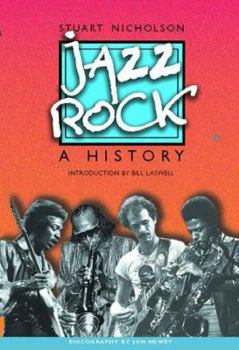Jazz-Rock: A History
Select Format
Select Condition 
Book Overview
Working with a very wide definition of Jazz-Rock that encompasses James Brown, Jack Bruce, Carlos Santana, The Grateful Dead, Sly and the Family Stone, and Jimi Hendrix, as well as more obvious choices such as Miles Davis, Weather Report, Chick Corea, and Jack DeJohnette, the author explores the his
Format:Hardcover
Language:English
ISBN:0028646797
ISBN13:9780028646794
Release Date:January 1998
Publisher:Schirmer Trade Books
Length:448 Pages
Weight:1.85 lbs.
Dimensions:1.5" x 6.4" x 9.6"
Customer Reviews
3 ratings
Jazz Rock a History rocks
Published by Thriftbooks.com User , 15 years ago
If you want to know when why who and how this is the book that you've gotta have. There are other books that give more in depth on specifics or give a song analysis or two but no book is as comprehensive on the subject of jazz rock as this one.
important work on subject, and a great music book
Published by Thriftbooks.com User , 24 years ago
While the late sixties is generally thought of as the flowering of psychedelic and progressive rock, equally important and contemporary to these was the birth of jazz rock. Stuart Nicholson's important new book covers the meeting of these two genres of music, jazz and rock, mainly from the jazz side. It begins with a survey of the impact of rock on the commercial music scene, and then shows how various jazz musicians reacted to and adapted to it. This varied from the still surviving big bands incorporating some popular rock tunes in their sets, pop groups such as Blood, Sweat & Tears using a brass section, to the likes of Miles Davis, who was already one of the top jazz stars and went on to produce probably the most advanced music of the psychedelic era. Nicholson does an excellent job of showing how the music fit into the time period, and while he only gives passing mention to most rock bands, he shows their relationship to the jazz musicians as part of the overall music and cultural scene. For instance, he argues that Chick Corea's "Romantic Warrior" was in answer to Rick Wakeman's medieval theme discs of the time.In Nicholson's view, from the 30's till the mid-50's, jazz was an essential flavor in pop music. Nat King Cole and Frank Sinatra were originally jazz oriented singers. Starting with be-bop in the mid-40's, the leading edge of jazz began to loose its popular audience as the music became more and more complex. With the advent of rock and roll in the 50's, the youth dominated music audience turned their backs on jazz and embraced the new more basic electrified blues based sound coming out on 45's. By the mid-60's, rock ruled the music scene and jazz was largely a specialist genera, which consisted on one hand of traditional swing and Dixieland oldies, and on the other of the more extreme free jazz players, which was too experimental for the general audience. In the middle were the bop and cool jazz players, who while being somewhat accessible to the mainstream, by `66 were not exactly the latest thing. For some, incorporating rock elements was merely a way to keep making music for a living. On the artistic side, jazz had the essential component of improvisation, which appeared to be one direction for rock to go as it mutated from pop to more a serious art form. As rock musicians began to experiment with mind expanding drugs, they attempted to create a music which was inspired by their experiences, and would be listened to by other psychic explorers. One of the principal forms of extending the blues based pop format is through improvisation on a catchy riff, much of classic jazz is basically improvisations on blues themes. Since rock is also generally blues based, it seems like an obvious evolution in retrospect. Nicholson goes into some detail showing how bands such as Cream, Pink Floyd, King Crimson and the Grateful Dead incorporated aspects of improvisation without ever really being considered ja
If you love jazz rock, you will like this book
Published by Thriftbooks.com User , 25 years ago
Especially considering the paucity of work on the jazz rock/fusion genre, I think this is a great resource and a fun read for those of us into all that stuff. I was most annoyed, however, at the number of name errors: Shaun Lane was referred to as Shaun Lake, Gordon Sumner was Gordon Summer, and Leni Stern was Lennie Stern. Shoot the editor and fact checker! I was also annoyed that he mentioned Miles Davis' solo work on a Scritti Politti single, but didn't relate that to Miles' previous cover of a Scritti Politti single "Perfect Way." Otherwise, I recommend it.






